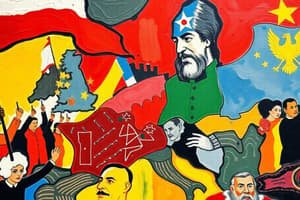Podcast
Questions and Answers
What is the primary focus of nationalism as an ideology?
What is the primary focus of nationalism as an ideology?
- National identity, unity, and self-governance (correct)
- Social equality and human rights
- Environmental protection and sustainability
- Economic development and modernization
What historical event contributed to the emergence of nationalism in Europe?
What historical event contributed to the emergence of nationalism in Europe?
- The Revolutions of 1848
- The Industrial Revolution
- The French Revolution (correct)
- The Enlightenment
What was a key feature of nationalist movements in Europe?
What was a key feature of nationalist movements in Europe?
- Focus on international cooperation and diplomacy
- Emphasis on reason and rationality
- Support for colonialism and imperialism
- Belief in the superiority of one's nation (correct)
Which of the following was a consequence of nationalist movements in Europe?
Which of the following was a consequence of nationalist movements in Europe?
Which leader was associated with the Italian Unification movement?
Which leader was associated with the Italian Unification movement?
What was a criticism of nationalism in Europe?
What was a criticism of nationalism in Europe?
Which of the following was a result of nationalist movements in Europe?
Which of the following was a result of nationalist movements in Europe?
What was a key feature of nationalist ideology?
What was a key feature of nationalist ideology?
Which of the following was a consequence of nationalist movements in Europe?
Which of the following was a consequence of nationalist movements in Europe?
Flashcards are hidden until you start studying
Study Notes
Nationalism in Europe
Definition of Nationalism
- An ideology that emphasizes the importance of national identity, unity, and self-governance
- Emphasizes the loyalty and devotion of citizens to their nation-state
Historical Background
- Emerged as a response to the French Revolution and the Enlightenment
- Spread across Europe in the 19th century, particularly during the Revolutions of 1848
- Contributed to the unification of Italy and Germany in the late 19th century
Key Features
- Emphasis on shared history, culture, and language
- Belief in the uniqueness and superiority of one's nation
- Desire for independence and self-governance
- Often linked to romanticism, emphasizing emotion and passion over reason
Impact on European Politics
- Contributed to the redrawing of European borders and the creation of new nation-states
- Led to the rise of fascist and nationalist regimes in the 20th century (e.g., Nazi Germany, Fascist Italy)
- Influenced the development of European politics and international relations
Examples of Nationalist Movements in Europe
- Italian Unification (1815-1871): Led by Giuseppe Garibaldi and Victor Emmanuel II
- German Unification (1815-1871): Led by Otto von Bismarck
- Irish Nationalism (late 19th-early 20th centuries): Led by figures such as Charles Stewart Parnell and Éamon de Valera
Criticisms and Controversies
- Often associated with xenophobia, racism, and militarism
- Can lead to conflict and war between nations
- Can be used to justify authoritarianism and suppress minority rights
Nationalism in Europe
- Nationalism is an ideology that emphasizes national identity, unity, and self-governance, and the loyalty and devotion of citizens to their nation-state.
Historical Background
- Nationalism emerged as a response to the French Revolution and the Enlightenment.
- It spread across Europe in the 19th century, particularly during the Revolutions of 1848.
- It contributed to the unification of Italy and Germany in the late 19th century.
Key Features
- Nationalism emphasizes shared history, culture, and language.
- It believes in the uniqueness and superiority of one's nation.
- It desires independence and self-governance, and is often linked to romanticism, emphasizing emotion and passion over reason.
Impact on European Politics
- Nationalism contributed to the redrawing of European borders and the creation of new nation-states.
- It led to the rise of fascist and nationalist regimes in the 20th century (e.g., Nazi Germany, Fascist Italy).
- It influenced the development of European politics and international relations.
Examples of Nationalist Movements in Europe
- Italian Unification (1815-1871): Led by Giuseppe Garibaldi and Victor Emmanuel II, resulted in the unification of Italy.
- German Unification (1815-1871): Led by Otto von Bismarck, resulted in the unification of Germany.
- Irish Nationalism (late 19th-early 20th centuries): Led by figures such as Charles Stewart Parnell and Éamon de Valera, sought independence from British rule.
Criticisms and Controversies
- Nationalism is often associated with xenophobia, racism, and militarism.
- It can lead to conflict and war between nations.
- It can be used to justify authoritarianism and suppress minority rights.
Studying That Suits You
Use AI to generate personalized quizzes and flashcards to suit your learning preferences.




